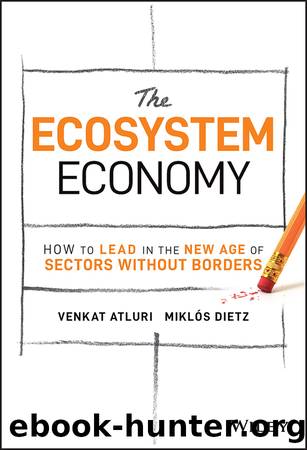The Ecosystem Economy by Venkat Atluri & Miklós Dietz

Author:Venkat Atluri & Miklós Dietz [Atluri, Venkat & Dietz, Miklós]
Language: eng
Format: epub
ISBN: 9781119984795
Publisher: Wiley
Published: 2022-10-18T00:00:00+00:00
Step 1b: Propositions
After considering your changing customer base and their evolving needs, we continue our process by assessing the propositions you are currently offering and determining how to evolve them given the insights we gained from step 1a. If you are an automotive OEM, for instance, your proposition has traditionally been manufacturing cars and selling them (often through intermediaries) to both consumers and businesses. In the new ecosystem world, you need to find a way of shifting or growing that proposition. There are a multitude of options. To take just one example, you could enter into the proposition of offering mobility as a service by owning (and potentially operating) the cars you produce in a semi-vertically-integrated fashion. By mobility as a service, we mean an on-demand, app-based service that allows users to request and get picked up by an autonomous vehicle, which would then deliver them to their chosen destination for a price to be determined by mileage, demand, and other factors.
Alternatively, you could choose a narrower focus that is still attuned to the big technology and consumer shifts you have observed. You could, for instance, concentrate on building cars designed to be integrated into a living-room-on-wheels or office-on-wheels propositionâthat is to say, you could center your business on turning cars into comfortable, luxury spaces to be rented while moving between locations. While this is an attractive proposition, pursuing it would mean completely changing how you think about your core product. In the future, if it's true that fewer cars will be necessary, their design would need to be completely overhauled to accommodate the new role that cars would play in society. As we mentioned earlier, in such a scenario, it's likely that autonomous cars would be deployed much more efficiently than individually owned cars are today. As such, they would need to be designed to be kept running for a much greater portion of each day. They would also need to be more spacious and equipped with better amenities to meet rising consumer expectations. Fortunately, these cars would require neither a driver nor an internal combustion engine, meaning there would be significantly more room on board for the furniture and equipment necessary to create the desired spaceâwhether a living room, office, or some other room-on-wheels.
For other players in the automotive space, the process of assessing and evolving your propositions may look a little different. If you are a software component or systems player in the auto industry, for instance, you could offer a software platform that serves as a sort of operating system for mobility-as-service players, including all the many capabilities that come with connected and intelligent cars. If you're a manufacturer of car seats, you might pivot to making other sorts of furniture for carsâpieces that are more comfortable or better suited to the living-room-on-wheels proposition.
Again, we might ask: How is step 1b any different from what companies are currently doing and planning? Of course, thinking about how to refine your value proposition is not a radical idea, but we are proposing something more than that.
Download
This site does not store any files on its server. We only index and link to content provided by other sites. Please contact the content providers to delete copyright contents if any and email us, we'll remove relevant links or contents immediately.
Rich Dad Poor Dad by Robert T. Kiyosaki(6632)
Bad Blood by John Carreyrou(6621)
Principles: Life and Work by Ray Dalio(6447)
Playing to Win_ How Strategy Really Works by A.G. Lafley & Roger L. Martin(6303)
Management Strategies for the Cloud Revolution: How Cloud Computing Is Transforming Business and Why You Can't Afford to Be Left Behind by Charles Babcock(4572)
The Confidence Code by Katty Kay(4260)
Thinking in Bets by Annie Duke(4226)
American Kingpin by Nick Bilton(3886)
Delivering Happiness by Tony Hsieh(3425)
Project Animal Farm: An Accidental Journey into the Secret World of Farming and the Truth About Our Food by Sonia Faruqi(3221)
The Power of Habit by Charles Duhigg(3139)
The Tyranny of Metrics by Jerry Z. Muller(3072)
The Marketing Plan Handbook: Develop Big-Picture Marketing Plans for Pennies on the Dollar by Robert W. Bly(3062)
Brotopia by Emily Chang(3054)
Mastering Bitcoin: Programming the Open Blockchain by Andreas M. Antonopoulos(3042)
I Live in the Future & Here's How It Works by Nick Bilton(2997)
The Content Trap by Bharat Anand(2924)
Building a StoryBrand by Donald Miller(2912)
Applied Empathy by Michael Ventura(2902)
